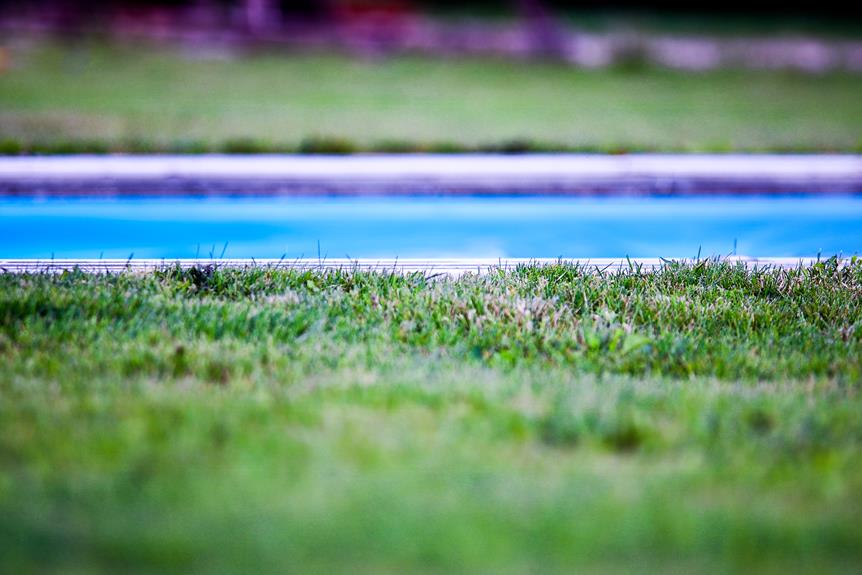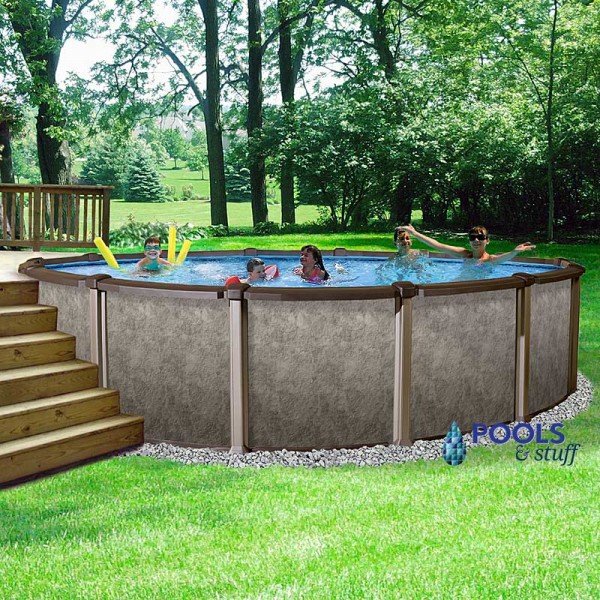Are you ready to take the plunge into owning an above ground pool? Well, get ready to make a splash because we’ve got all the information you need! In this article, we’ll dive into the average lifespan of above ground pools and the benefits they offer. From steel to resin to hybrid pools, we’ll help you find the perfect fit for your backyard oasis. Plus, we’ll share essential tips to ensure your pool lasts as long as possible. So, let’s make a splash and get started!
Key Takeaways
- The average lifespan of above ground pools is between 7 and 15 years.
- Above ground pools can be enjoyed for the majority of a homeowner’s time in the house, as the majority of homeowners stay in one home for nearly 10 years.
- Choosing the right type of above ground pool depends on unique needs and preferences, with options including steel, resin, and hybrid pools.
- Proper care and maintenance, such as regular cleaning, chemical treatment, and addressing small problems promptly, can help increase the lifespan of the pool.
Typical Lifespan of Above Ground Pools
On average, you can expect an above ground pool to last between 7 and 15 years. The durability of above ground pools, also known as AGPs, depends on various factors. The lifespan of your pool can be influenced by the type of pool you choose, the quality of materials used, and how well you maintain it. Steel above ground pools have sturdy frames and a thick coat of polyester paint, providing excellent durability. Some steel pool brands even offer warranties of 20 years or longer.
Resin pools are also a popular choice, known for their toughness and longevity, with some brands offering lifetime warranties. Hybrid pools combine the strength of steel with the durability of resin, providing a balanced option. Proper care and maintenance, such as regular cleaning, chemical balancing, and addressing any issues promptly, can help extend the lifespan of your above ground pool. In the next section, we will explore the factors that can impact the durability of above ground pools.
Factors Affecting the Durability of Above Ground Pools
There are several factors that can affect the durability of your above ground pool. First, the material used for the pool construction plays a significant role. Steel pools with a thick coat of polyester paint and resin pools with lifetime warranties are known for their toughness and longevity. Second, proper maintenance and care are crucial for ensuring the longevity of your pool. Regularly clearing debris, maintaining the chemical balance, and addressing small problems promptly can help increase the lifespan of your pool. Lastly, environmental factors such as extreme weather conditions and exposure to sunlight can also impact the durability of your above ground pool.
Material Impact on Durability
When it comes to the durability of above ground pools, the material used has a significant impact on how long the pool will last. Pool lifespan factors and pool materials play a crucial role in determining the longevity of your pool. Here are some key points to consider when it comes to the material impact on durability:
- Steel above ground pools: These pools have sturdy frames and a thick coat of polyester paint, providing excellent durability. Some steel pool brands even offer warranties of 20 years and longer.
- Resin pools: Made from tough and long-lasting materials, resin pools are known for their durability. Some brands even offer lifetime warranties.
- Hybrid pools: These pools combine the strength of steel with the durability of resin, providing a balance between the two materials.
- Choosing the right pool material: The choice of pool material depends on your unique needs and preferences. Consider factors such as budget, climate, and maintenance requirements.
- Prolonging pool life: Proper care, regular maintenance, and addressing small problems promptly can help prolong the life of your above ground pool.
Maintenance and Care
To ensure your above ground pool remains in good condition, regularly checking and maintaining pool equipment is crucial. Proper pool maintenance is key to increasing the lifespan of your pool and ensuring it provides years of enjoyment for you and your family. Regularly filter the water, clear out debris, and maintain the proper chemical balance. Avoid using heavy-duty weed eaters or metal edgers around the pool to prevent damage. Check the pool walls for rust formation and the pool liner for any holes. Address small problems as soon as possible to prevent them from becoming bigger issues. Cover the pool during winter or when not in use for an extended period. Seek professional help for any major repairs or maintenance needs. By keeping up with pool upkeep, you can ensure a longer lifespan for your above ground pool.
Now, let’s discuss the environmental factors that can affect the lifespan of your above ground pool.
Environmental Factors Affecting Lifespan
Maintaining proper care and protection from environmental factors like harsh weather and sun exposure will help maximize the lifespan of your above ground pool. To extend the life of your pool and ensure its preservation, here are some key pool care tips:
- Regularly clean and maintain your pool filter to keep the water clear and debris-free.
- Make sure to remove any leaves, dirt, or other debris from the pool on a regular basis.
- Keep a proper chemical balance in the water to prevent algae growth and maintain water clarity.
- Avoid using heavy-duty weed eaters or metal edgers around the pool, as they can cause damage to the pool walls and liner.
- Regularly inspect your pool walls for any signs of rust formation and check the pool liner for any holes or tears.
Importance of Maintenance Practices for Longevity
To ensure the longevity of your above ground pool, it is crucial to prioritize maintenance practices. Regularly maintaining your pool increases its lifespan by preventing small problems from becoming major issues. Clearing out debris, maintaining proper chemical balance, and addressing any rust formation or holes in the pool liner are essential steps in keeping your pool in excellent condition. Additionally, covering the pool when not in use protects it from the elements and helps to extend its lifespan even further.
Regular Maintenance Increases Lifespan
Regular maintenance is crucial for increasing the lifespan of your above ground pool. By following these maintenance tips, you can ensure that your pool lasts for many years to come:
- Clean the pool regularly by removing debris and leaves from the surface and skimming the water.
- Check and balance the water chemistry regularly to prevent algae growth and maintain proper pH levels.
- Inspect the pool equipment, such as filters and pumps, for any signs of wear or damage.
- Brush the pool walls and floor to prevent the build-up of dirt and algae.
- Cover the pool when not in use to protect it from the elements and minimize evaporation.
Preventing Small Problems Early
By addressing small issues as soon as possible, you can prevent them from becoming bigger problems with your above ground pool. Regular maintenance is key to ensuring the longevity of your pool. When you notice any minor problems, such as a small leak or a loose fitting, take immediate action. Ignoring these small issues can lead to more significant damage, which can be costly to repair. Regularly inspect your pool for signs of wear and tear, such as rust formation on the walls or holes in the pool liner. Clear out debris and maintain the proper chemical balance in the water to keep it clean and safe. By staying on top of these small tasks, you can enjoy your above ground pool for many years to come.
Covering Pool When Not in Use
When you’re not using your pool, covering it with a pool cover is essential to protect it from debris and prevent evaporation. Here are some reasons why covering your pool is important:
- Keeps out debris: A pool cover acts as a barrier, preventing leaves, twigs, and other debris from falling into your pool. This not only saves you time and effort in cleaning, but also helps maintain the water quality.
- Reduces evaporation: By covering your pool, you can significantly reduce water evaporation, which not only saves water but also helps maintain the chemical balance of the pool.
- Prevents algae growth: A covered pool is less exposed to sunlight, which inhibits the growth of algae. This means less time spent on algae treatment and more time enjoying a clean pool.
- Safety measure: A securely covered pool acts as a safety measure, especially if you have children or pets. It prevents accidental falls and keeps them away from the water.
- Energy savings: By reducing evaporation and maintaining the water temperature, a pool cover can help save on heating costs.
Signs of Wear and Tear in Above Ground Pools
You can easily identify signs of wear and tear in your above ground pool by checking for rust formation on the pool walls and any holes in the pool liner. Rust can occur due to exposure to moisture and chemicals, so it’s important to regularly inspect your pool for any signs of corrosion. Additionally, holes in the pool liner can lead to water leakage and potential damage to the pool structure. By being vigilant and addressing these issues promptly, you can extend the lifespan of your above ground pool. However, there may come a time when you need to consider whether to replace or refurbish your pool. Understanding when to make this decision is crucial in maintaining a safe and enjoyable swimming experience.
When to Replace or Refurbish an Above Ground Pool
If your above ground pool is showing significant signs of wear and tear, it may be time to consider whether it’s more cost-effective to replace or refurbish it. Before making a decision, here are some factors to consider:
- Assess the extent of the damage: Determine if the issues can be easily repaired or if they require a complete replacement.
- Compare costs: Research the cost of refurbishing the pool versus the cost of purchasing a new one.
- Consider the lifespan: If your pool is already nearing its average lifespan of 7-15 years, it might be more practical to invest in a new pool.
- Evaluate your needs: Determine if your current pool still meets your requirements in terms of size, features, and functionality.
- Consult a professional: Seek advice from an experienced pool contractor who can provide expert guidance on the best course of action.
Considering these factors will help you make an informed decision about whether to replace or refurbish your above ground pool. If you decide to replace, steel above ground pools are a popular choice due to their sturdy frames and long-lasting durability.
Steel Above Ground Pools: Sturdy and Durable
Steel above ground pools are known for their strong frames and durability, making them a reliable choice for homeowners. The sturdy construction of steel pools provides long-lasting support and stability for years of enjoyment and relaxation. With a thick coat of polyester paint, steel pools are resistant to rust and corrosion, ensuring their durability over time. Many steel pool brands offer warranties of 20 years or longer, giving homeowners peace of mind. The combination of strength and durability makes steel above ground pools a popular choice among homeowners. Whether you’re looking for a pool to enjoy for a few years or for the long term, steel pools are a reliable option that will withstand the test of time.
Resin Above Ground Pools: Tough and Long-lasting
Resin above ground pools are a popular choice for those seeking a tough and long-lasting pool option. With their durable construction and ability to withstand the elements, resin pools offer a reliable and low-maintenance solution for your swimming needs. Whether you’re looking for a pool that can withstand harsh weather conditions or simply want a pool that will last for years to come, a resin above ground pool is a great investment.
Benefits of Resin Pools
When properly cared for, resin pools can last for many years, providing you with a durable and low-maintenance swimming option. Here are the benefits of resin pools:
- Resin pools are tough and long-lasting, designed to withstand the elements and resist corrosion.
- They require minimal maintenance, saving you time and effort.
- Resin pools are resistant to fading and discoloration, maintaining their aesthetic appeal over time.
- They are less prone to cracking and damage compared to other pool materials.
- Resin pools offer a comfortable and smooth surface for swimming, enhancing your overall swimming experience.
With these benefits, resin pools are a popular choice for homeowners looking for a reliable and long-lasting swimming option. Now, let’s explore the lifespan of resin pools and how they compare to other types of above ground pools.
Lifespan of Resin Pools
If properly maintained, you can enjoy your resin pool for many years due to its durability and resistance to corrosion. Resin pools are known for their longevity, making them a great investment for your backyard oasis. With proper care and maintenance, a well-built resin pool can last 15 to 20 years or even longer. The high-quality materials used in resin pools make them resistant to rust and corrosion, ensuring that your pool remains in excellent condition for years to come. Regularly cleaning and monitoring the pool water, clearing out debris, and checking for any signs of damage will help prolong the lifespan of your resin pool. Additionally, following manufacturer guidelines and seeking professional help for any major repairs or maintenance needs will ensure that you can enjoy your pool for many summers to come.
Durability of Resin Pools
With its strong and corrosion-resistant materials, you’ll find that a well-built resin pool can withstand years of use and provide you with a durable backyard oasis. Here are some key points about the durability of resin pools:
- Resin pools are constructed using high-quality materials that are resistant to rust, corrosion, and fading.
- The materials used in resin pools are designed to withstand harsh weather conditions, including extreme temperatures and UV exposure.
- Resin pools have a solid structure that can withstand the weight of water and the pressure from daily use.
- The resin material used in these pools is non-porous, making it resistant to algae and mold growth.
- Many resin pool manufacturers offer lifetime warranties, ensuring that your pool will remain durable and in good condition for years to come.
Now let’s explore the strength and durability of hybrid above ground pools, which combine the best features of steel and resin construction.
Hybrid Above Ground Pools: Strength and Durability Combined
Hybrid above ground pools combine the strength of steel and the durability of resin, providing you with a long-lasting and reliable swimming experience. These pools are constructed with a steel frame that offers exceptional strength and stability, while the resin components ensure longevity and resistance to corrosion. The steel frame provides a solid foundation, while the resin walls and top rails are resistant to rust and UV damage. This combination of materials creates a pool that can withstand the elements and offer years of enjoyment. When choosing the right pool for your needs, consider factors such as size, shape, and design options. Additionally, think about your budget and maintenance requirements. By carefully considering these factors, you can select a hybrid above ground pool that perfectly suits your preferences and provides you with a durable and enjoyable swimming experience.
Choosing the Right Pool for Your Needs
When choosing the right pool for your needs, consider factors such as size, shape, and design options. Here are some things to keep in mind:
- Size: Determine how much space you have available in your yard and how many people will be using the pool. This will help you decide on the appropriate size.
- Shape: Above ground pools come in various shapes, including round, oval, and rectangular. Consider which shape will best fit your yard and aesthetic preferences.
- Design options: Look into different design features such as decking, fencing, and landscaping options to enhance the overall look of your pool area.
- Budget: Set a budget and stick to it. Consider not only the initial cost of the pool, but also ongoing maintenance and operating expenses.
- Installation: Decide whether you want to install the pool yourself or hire a professional for the job.
Once you’ve chosen the right pool, it’s important to ensure proper water filtration for above ground pools.
Proper Water Filtration for Above Ground Pools
To properly maintain your above ground pool and ensure clean and clear water for swimming, it is essential to prioritize water filtration. Regularly cleaning and maintaining your pool’s filter is crucial in removing debris, contaminants, and impurities from the water. By choosing the right filter and implementing proper filtration techniques, you can enjoy a pristine and hygienic swimming experience in your above ground pool.
Filter Maintenance Tips
Regularly checking and cleaning the pool filter is essential to ensure proper water circulation and maintain the longevity of your above ground pool. Here are some important tips to keep in mind:
- Clean the filter regularly to prevent debris buildup and maintain optimal filtration efficiency.
- Check the pressure gauge on the filter system and clean or replace the filter when the pressure rises above the recommended level.
- Backwash the filter periodically to remove trapped dirt and debris.
- Inspect the filter for any signs of damage or wear, such as cracks or tears in the filter cartridge.
- Consider investing in a high-quality filter system that is suitable for your pool size and usage.
Importance of Clean Water
Keeping your pool water clean is crucial for maintaining a healthy and enjoyable swimming experience. Clean water not only looks inviting, but it also prevents the growth of harmful bacteria and algae that can cause skin irritations and other health issues. Regular maintenance and proper care are essential to ensure that your pool water stays clean and safe for swimming. Here are some important steps to follow:
| Care for Above Ground Pools | Maintenance of Above Ground Pools |
|---|---|
| Filter the water when the pool is filled | Address small problems as soon as possible to prevent them from becoming bigger issues |
| Regularly clear out debris from the pool | Proper maintenance helps increase the lifespan of the pool |
| Ensure proper chemical mixture for the water | Cover the pool during winter or when not in use for an extended period |
| Avoid using heavy-duty weed eaters or metal edgers around the pool | Regularly check and maintain pool equipment |
| Regularly check pool walls for rust formation and pool liner for holes | Seek professional help for any major repairs or maintenance needs |
Choosing the Right Filter
When selecting a filter, consider your unique needs and preferences to ensure you choose the right one for your above ground pool. Here are some key factors to consider:
- Filter type: There are three main types of filters for above ground pools: sand, cartridge, and diatomaceous earth (DE). Each has its pros and cons, so research and choose the one that best suits your pool and maintenance preferences.
- Pool size: The size of your pool will determine the flow rate and capacity requirements of the filter. Ensure that the filter you choose can handle the volume of water in your pool effectively.
- Maintenance requirements: Different filters have different maintenance needs. Some may require more frequent cleaning or backwashing, while others may need cartridge replacements. Consider your willingness and ability to perform regular maintenance tasks.
- Cost: Filters vary in price, so it’s important to consider your budget. However, don’t compromise on quality for the sake of saving money. Invest in a filter that will effectively keep your pool clean and clear.
- Brand reputation: Research and choose a reputable brand known for producing high-quality filters. Read reviews and seek recommendations from pool professionals to ensure you’re making a reliable choice.
Debris Clearing Techniques for Maintaining a Clean Pool
To maintain a clean pool, you should regularly clear out debris from the water. Debris such as leaves, twigs, and insects can accumulate in your pool and affect its cleanliness and water quality. To remove debris, you can use a skimmer net or a pool vacuum. Skimmer nets are effective in removing larger debris floating on the surface of the water, while pool vacuums are designed to clean the bottom of the pool and remove smaller debris. It is recommended to skim the surface of the water daily and vacuum the pool at least once a week. By regularly clearing out debris, you can ensure that your pool remains clean and inviting for you and your family to enjoy.
Chemical Maintenance Tips for Water Quality
To maintain the water quality of your above ground pool, it is important to follow proper chemical maintenance tips. By doing so, you can ensure that your pool water remains clean, safe, and enjoyable for swimming. Here are five essential tips to help you maintain the water quality:
- Test the water regularly using a pool water testing kit to monitor the chemical levels such as chlorine, pH, and alkalinity.
- Balance the water chemistry by adjusting the chlorine and pH levels as needed. This will help prevent algae growth and maintain clear water.
- Shock the pool on a weekly basis or after heavy use to destroy organic contaminants and maintain proper sanitation.
- Use algaecide as a preventive measure to inhibit the growth of algae and keep the water crystal clear.
- Clean the pool filter regularly to ensure efficient filtration and remove any debris or contaminants that may be present.
Preventing Damage From Landscaping Tools
To prevent damage from landscaping tools, be cautious and avoid using heavy-duty weed eaters or metal edgers around your pool. These tools have the potential to cause scratches or puncture the pool liner, which can lead to leaks and costly repairs. Instead, opt for lightweight and non-abrasive tools specifically designed for pool maintenance. When working near the pool, be mindful of the distance between the tool and the pool’s edge to prevent accidental contact. Additionally, consider creating a protective barrier, such as a plastic or rubber edging, around the pool to provide an extra layer of defense against potential damage. By taking these precautions, you can enjoy a well-maintained and damage-free pool for years to come.
Importance of Timely Repairs and Regular Maintenance
Regular repairs and maintenance are crucial for ensuring the longevity and optimal performance of your above ground pool. To keep your pool in top shape, here are some important steps to follow:
- Regularly clean and clear out debris from the pool to prevent clogs and damage to the filtration system.
- Check and balance the chemical levels in the water to maintain a safe and clean swimming environment.
- Inspect the pool walls for any signs of rust formation and the pool liner for any holes or tears.
- Address small problems promptly to prevent them from becoming bigger issues that may require costly repairs.
- Cover the pool during winter or when not in use for an extended period to protect it from harsh weather conditions.
Frequently Asked Questions
Can I Use Heavy-Duty Landscaping Tools Near My Above Ground Pool Without Causing Damage?
Yes, you can use heavy-duty landscaping tools near your above ground pool, but it is advisable to exercise caution to avoid causing damage. It’s important to avoid using tools like heavy-duty weed eaters or metal edgers directly around the pool, as they can potentially damage the pool walls or liner. To ensure the longevity of your pool, it’s best to take preventive measures and use lighter landscaping tools or manual methods near the pool area.
How Often Should I Check and Maintain the Equipment of My Above Ground Pool?
To ensure the longevity of your above ground pool, it’s important to regularly check and maintain the equipment. This includes inspecting the filter, pump, and other components for any signs of wear or damage. Addressing small issues promptly can prevent them from becoming bigger problems. Additionally, covering the pool during winter or extended periods of non-use can help protect the equipment. Remember, proper maintenance is key to maximizing the lifespan of your pool and ensuring years of enjoyment.
What Are the Signs of Wear and Tear That I Should Look Out for in My Above Ground Pool?
To ensure the longevity of your above ground pool, it’s important to be aware of signs of wear and tear. Look out for rust formation on the pool walls and holes in the pool liner. Address small problems promptly to prevent them from becoming bigger issues. Regularly check and maintain pool equipment and cover the pool when not in use. Seeking professional help for major repairs or maintenance needs is advisable. Taking these steps will help increase the lifespan of your pool.
How Do I Know When It Is Time to Replace or Refurbish My Above Ground Pool?
When it’s time to replace or refurbish your above ground pool, there are some signs to look out for. If you notice significant rust formation on the pool walls or holes in the liner, it may be time for a new pool. Addressing small problems promptly can prevent them from becoming bigger issues. Regular maintenance, such as checking pool equipment and covering the pool during winter or extended periods of non-use, can help extend the lifespan of your pool.
What Are Some Tips for Preventing Damage From Landscaping Tools to My Above Ground Pool?
To prevent damage from landscaping tools to your above ground pool, there are a few tips to keep in mind. First, avoid using heavy-duty weed eaters or metal edgers around the pool area. These tools can cause accidental scratches or punctures to the pool liner. Secondly, regularly check the pool walls for any signs of rust formation and the pool liner for holes. Addressing these issues promptly can prevent them from becoming bigger problems. By following these tips, you can help maintain the integrity and longevity of your above ground pool.
Conclusion
In conclusion, above ground pools offer homeowners a long-lasting source of enjoyment and relaxation in their own backyard. With an average lifespan of 7 to 15 years, these pools can provide years of fun for families. By choosing the right type of pool and practicing proper maintenance, you can significantly increase its durability. So, dive into the world of above ground pools and create lasting memories with your loved ones. It’s like having a personal oasis that will make your neighbors green with envy!








